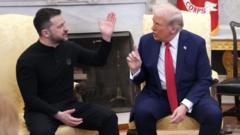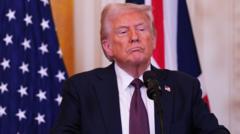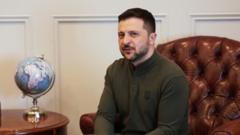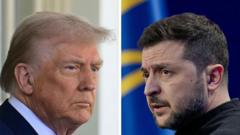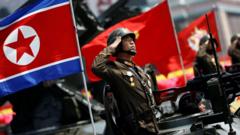In light of waning American support, Ukraine pivots towards Europe for military backing and reassesses its leverage against Russia.**
Ukraine's Strategic Shift: Navigating a New Reality Amid Uncertain Alliances**

Ukraine's Strategic Shift: Navigating a New Reality Amid Uncertain Alliances**
As Trump’s leadership redefines U.S.–Ukraine relations, Kyiv seeks alternatives for support against Russia.**
Despite the unpredictability of U.S. politics, Ukraine is forced to reevaluate its strategic stance amidst growing tensions with Washington. Since President Trump's administration took office, his increasingly antagonistic rhetoric towards Ukraine has made Kyiv wary of relying on American support as a cornerstone of its defense strategy against Russia.
In recent weeks, Trump initiated direct peace negotiations with Russia while disregarding Ukraine’s calls for inclusion in discussions. By labeling President Volodymyr Zelensky a “dictator” and pinning blame for the conflict on Ukraine itself, Trump has left Kyiv in a precarious position. As the conflict nears its fourth anniversary, there’s a palpable sense of urgency in Kyiv to identify alternative avenues for support.
Analysts indicate that Ukraine's options are limited and complex. While it might seek to negotiate lucrative economic agreements to win favor from Trump, doing so could lead to unfavorable stipulations that compromise Ukraine’s interests. Moreover, if U.S. backing continues to falter, the military landscape may shift dramatically as Ukraine struggles to hold ground.
Consequently, Ukraine has begun to forge closer ties with European allies, seeing them as potential guarantors of security. Recently, Zelensky has actively engaged with various European leaders, aiming for enhanced military assistance, potentially including peacekeeping forces. On this front, French President Emmanuel Macron has been vocal in advocating for Ukraine’s position in talks with U.S. leaders.
Overall, as geopolitical alliances are reconfigured, Ukraine faces difficult choices, striving to maintain its sovereignty in a landscape of shifting loyalties. The future remains uncertain as Kyiv seeks to remind the international community of its pivotal role in discussions surrounding peace and stability in the region.
In recent weeks, Trump initiated direct peace negotiations with Russia while disregarding Ukraine’s calls for inclusion in discussions. By labeling President Volodymyr Zelensky a “dictator” and pinning blame for the conflict on Ukraine itself, Trump has left Kyiv in a precarious position. As the conflict nears its fourth anniversary, there’s a palpable sense of urgency in Kyiv to identify alternative avenues for support.
Analysts indicate that Ukraine's options are limited and complex. While it might seek to negotiate lucrative economic agreements to win favor from Trump, doing so could lead to unfavorable stipulations that compromise Ukraine’s interests. Moreover, if U.S. backing continues to falter, the military landscape may shift dramatically as Ukraine struggles to hold ground.
Consequently, Ukraine has begun to forge closer ties with European allies, seeing them as potential guarantors of security. Recently, Zelensky has actively engaged with various European leaders, aiming for enhanced military assistance, potentially including peacekeeping forces. On this front, French President Emmanuel Macron has been vocal in advocating for Ukraine’s position in talks with U.S. leaders.
Overall, as geopolitical alliances are reconfigured, Ukraine faces difficult choices, striving to maintain its sovereignty in a landscape of shifting loyalties. The future remains uncertain as Kyiv seeks to remind the international community of its pivotal role in discussions surrounding peace and stability in the region.

